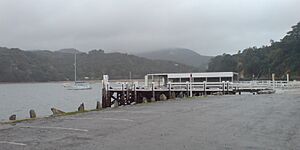Tryphena, New Zealand facts for kids
Quick facts for kids
Tryphena
|
|
|---|---|

Tryphena Ferry Terminal
|
|
| Country | New Zealand |
| Region | Auckland Region |
| Ward | Waitematā and Gulf ward |
| Local board | Aotea / Great Barrier Local Board |
| Electorates |
|
| Area | |
| • Total | 3.75 km2 (1.45 sq mi) |
| Population
(June 2023)
|
|
| • Total | 220 |
| • Density | 58.7/km2 (152/sq mi) |
Tryphena is a lovely beach settlement located on the southern coast of Great Barrier Island. This island is part of the Hauraki Gulf in New Zealand's Auckland Region.
The small town has a nice walkway, shops, and public places for everyone to use. It's also one of the few spots on Great Barrier Island with good mobile phone and internet service.
You can catch a car ferry from Wynyard Quarter to Tryphena, which takes about 4.5 hours. The Tryphena wharf has a shelter and a special toilet for wheelchairs. There's also some short-term parking available. However, there isn't a main terminal, ticket office, or public transport at the wharf.
Tryphena is a home for many amazing animals. You might spot New Zealand kaka (a type of parrot), kererū (native pigeons), rails (small birds), pateke (brown teal ducks), and even blue penguins. In the water, you could see dolphins and orcas swimming by!
The area is perfect for outdoor fun. People enjoy kayaking, paddleboarding, fishing, boating, and swimming in the clear waters.
History of Tryphena
The bay where Tryphena is now was once a traditional pā, which is a fortified settlement. This was home to the Ngāti Rehua Ngati Wai ki Aotea people.
In the 1800s, early European settlers arrived and first called the bay Port Tofino.
The settlement later got its name, Tryphena, from a brig (a type of sailing ship). This ship visited Great Barrier Island several times between 1841 and 1845.
Tryphena House was built in 1923, right in front of the old Tryphena wharf. It was even made using parts from a shipwreck found in the bay! Today, this historic building is used for accommodation.
In May 2020, during the COVID-19 pandemic in New Zealand, members of the Ngāti Rehua Ngati Wai ki Aotea community set up a checkpoint at Tryphena Wharf. They did this to help protect the island and its people by limiting visitors.
People of Tryphena
Tryphena is considered a rural settlement by Statistics New Zealand. It covers an area of about 3.75 square kilometers.
| Historical population | ||
|---|---|---|
| Year | Pop. | ±% p.a. |
| 2006 | 144 | — |
| 2013 | 177 | +2.99% |
| 2018 | 201 | +2.58% |
At the 2018 New Zealand census, Tryphena had a population of 201 people. This was an increase of 24 people since 2013, and 57 people since 2006. There were 81 households, with an equal number of males and females (102 each).
The average age of people in Tryphena was 51.6 years. About 13.4% of the population was under 15 years old.
Most people in Tryphena (91.0%) identified as European/Pākehā. About 26.9% identified as Māori. People could choose more than one ethnicity.
When asked about religion, 71.6% said they had no religion, while 22.4% were Christian.
Education in Tryphena
Mulberry Grove School is a school for students in years 1 to 8. It was started in 1962. As of February 2024. , it has 31 students.
There used to be another school called Tryphena School, which operated from 1884 to 1939. It closed because there weren't enough students attending.
 | Jewel Prestage |
 | Ella Baker |
 | Fannie Lou Hamer |

